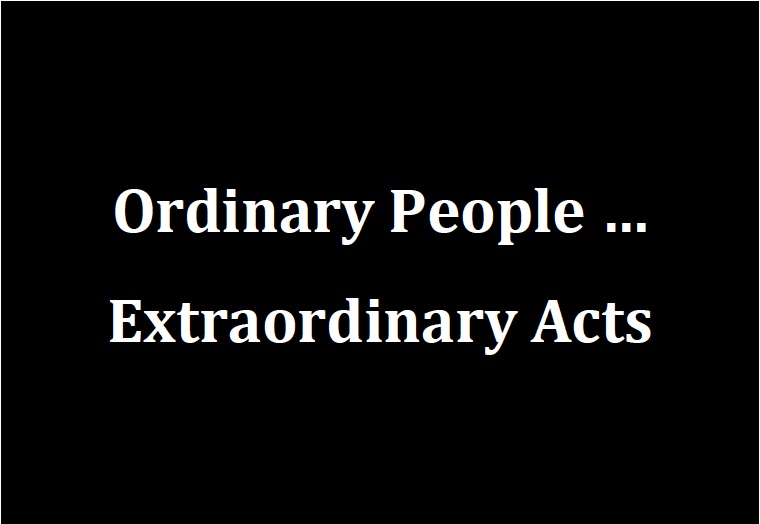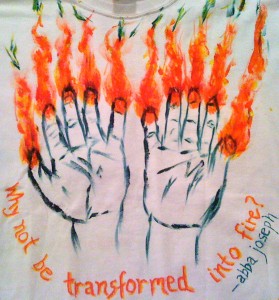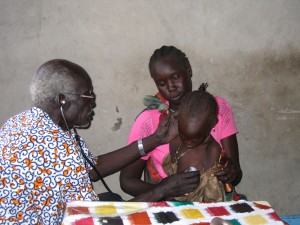Luke 1:39-55
In those days, two women came together in a small town in the hill country of Judea.
The one woman, who was so much older, we know was righteous before God, living blamelessly according to all the commandments and regulations of the Lord. We also know that for many years, she was barren, and that she was getting on in years.
Of the other woman, who was so very young, we know very little. We know only that she was young. That she was single. And that she was engaged to be married.
And we know that both women were pregnant, each expecting their first child.

Mary and Elizabeth rejoice (courtesy of Worship Sounds Music Blog, http://worshipsounds.wordpress.com)
The older woman knew that this child was a blessing from God, for to be barren in her culture meant to live in disgrace. And this child was, after all, promised to her by an angel of the Lord who had appeared to her husband.
The younger woman, not much more than a child herself really, also knew that her pregnancy was a blessing, for hadn’t that same angel appeared to her as well, and told her so?
But both women also knew that these pregnancies brought danger to them.
For the older woman, the danger lay in her age. She was indeed getting on in age, and to bear her first child when she was so old was precarious at best. So she remained in seclusion for the first five months, taking extreme care that nothing happened to her baby.
For the younger woman, the danger lay not in her age, but in her status. For she indeed was unmarried, and to be pregnant and single in those days exposed her to punishment, punishment which in the very least could include being “set aside,” rejected by her betrothed, and if taken to the extreme could mean being stoned to death according to the laws of her religion.
And yet … both women, when they came together in that small village in the hill country of Judea, rejoiced.
Because they had been chosen by the Lord.
Them.
Ordinary people.
Living ordinary lives.
Chosen to do extraordinary things.
On behalf of the Lord.
Part of what we celebrate in this season of Advent, and of what we will celebrate tomorrow night and Tuesday morning on Christmas Day, is that in order to achieve God’s miracles, God chose ordinary people to achieve extraordinary things.
Elizabeth, the older woman, and Mary, the younger woman, couldn’t have been more ordinary if you tried.
They were two simple women, one married, one single. In their society, they had few rights. They couldn’t own property. They couldn’t testify in court. They weren’t allowed to make their own decisions.
And yet … God chose them.
God sent an angel – the angel Gabriel, who stands in the presence of the Lord – to give them the good news that they, the ones society said were less than equal, the ones who considered themselves to be completely ordinary, had been chosen by God to achieve the extraordinary.
God chose ordinary old Elizabeth to be the mother of the last prophet of the Old Testament (Newsweek, December 2003), John, who would be called the Baptist. John, who would be great in the sight of the Lord. John, who would turn many of the people of Israel to the Lord their God. John, who would make ready a people prepared for the Lord.
And God chose ordinary young Mary to be the mother of God’s only begotten Son, Jesus, who would be called the Messiah. Jesus, who is the embodiment of the New Testament, who is the New Covenant that God makes with his people. Jesus, who gives God’s people new life and life eternal.
Two ordinary women, chosen by God, to achieve extraordinary things.
When most of us think about Elizabeth and Mary, lo, these two thousand years after the fact, we tend to think of them as special, as extraordinary women. Elizabeth is indeed a saint of the church, and Mary is, of course, the Blessed Virgin.
But when God came calling, in the form of the Angel Gabriel (in Elizabeth’s case, to her husband Zechariah), they weren’t yet saints, they weren’t yet blessed. They were just two women, going about their daily lives, trying to be righteous before the Lord.
Which is pretty much the same situation in which we find ourselves, when we find God calling in our lives. We, like Elizabeth and Mary, are, for the most part, pretty much ordinary people, living pretty much ordinary lives. Yes, we are special in the eyes of The Lord, each and every one of us a beloved child of God. God loves us as our mothers do – equally, none more, none less than anyone else.
We are, whether we like to admit it, ordinary people. Just like Elizabeth and Mary.
And yet … just as God called them, God calls us.
Ordinary people.
To do extraordinary things.
God calls us – through Elizabeth’s son, John who is called the Baptist – to prepare the way of the Lord, to make straight a path in the wilderness.

God calls us – through Mary’s son, Jesus who is the Messiah – to love our neighbors as ourselves, to heal the sick, to include the marginalized, to live radical lives driven by hope, filled with love, consumed with mercy.
God calls us – through Mary’s son, Jesus who is the Messiah – to do justice, no matter how hard that might be; to love kindness – even to the strangers among us; and to walk humbly with our God – not in God’s place, not pretending to be God, but with God.
We, who are rather ordinary people living rather ordinary lives, are called, just as Elizabeth and Mary were called.
By God
To do extraordinary things.
Will we answer that call?
Will we, like Elizabeth and Mary, have the courage to say “Yes,” even when we know that saying “Yes” could be as dangerous to us as it was dangerous to them, knowing that saying “Yes” might very well get us into trouble?
And will we, like Elizabeth and Mary, not only say “Yes,” will we rejoice in doing so? Will we magnify the Lord for looking with favor on the lowliness of his servants?
Will we bless the Mighty One for doing great things for us, and proclaim his name to be holy?
Because the fact of the matter is, we are called.
Not because we’re special.
But because we are ordinary.
Just like all those other ordinary people God called throughout the ages.
You see, whenever God wants to do something extraordinary in God’s good creation, God turns to ordinary people. Throughout history, God has asked ordinary people to do the extraordinary on his behalf: Noah. Abram and Sarai. Jacob. David. Debra. Elijah. Susannah. Isaiah. Jonah. Jeremiah. Obadiah. Ezekiel. Elizabeth. Mary.
And oh, my, were these ordinary people. Noah? Who was he, other than a carpenter – and apparently could build a boat. Abram? He was so concerned with saving his own skin he lied – twice! – about his wife! Jacob? He was a double-dealing liar! Gideon? He was so unimpressed with the visit by the angel that he made the angel prove – repeatedly – that he indeed was from God! Jeremiah? He spent his entire prophetic ministry complaining to God: “I don’t like these people! I don’t want to do this!” Jonah? He objected to God sending him to Ninevah so much that he ended up in the belly of the whale – and then ended up in Ninevah anyway! David? He was stinky shepherd! OK – he was tall and ruddy and handsome. But he stank!
All of them were ordinary people. Called by God. To do the extraordinary. On God’s behalf.
There was nothing terribly special about those people before they were called.
We remember them only because they answered God’s call.
There’s nothing terribly special about us, either.
We will be remembered only if we, like those who have gone before us, answer that call.
So that God’s extraordinary acts can be achieved.
In these holy seasons of Advent and Christmas, are we ready to say “Yes” so that we, too, can do extraordinary things on God’s behalf?
So that we can bring about God’s justice, God’s mercy, God’s love, God’s hope in this world?
God is calling.
How will we answer?
Amen.
Sermon preached at Emmanuel Episcopal Church, Staunton, Va., on the Fourth Sunday of Advent, Year C, 23 December, 2012.











